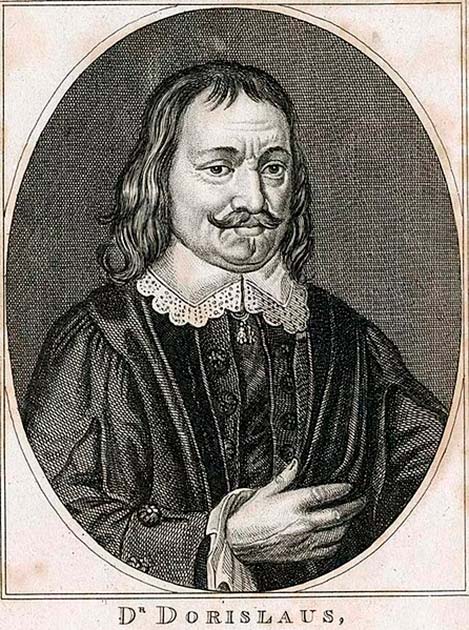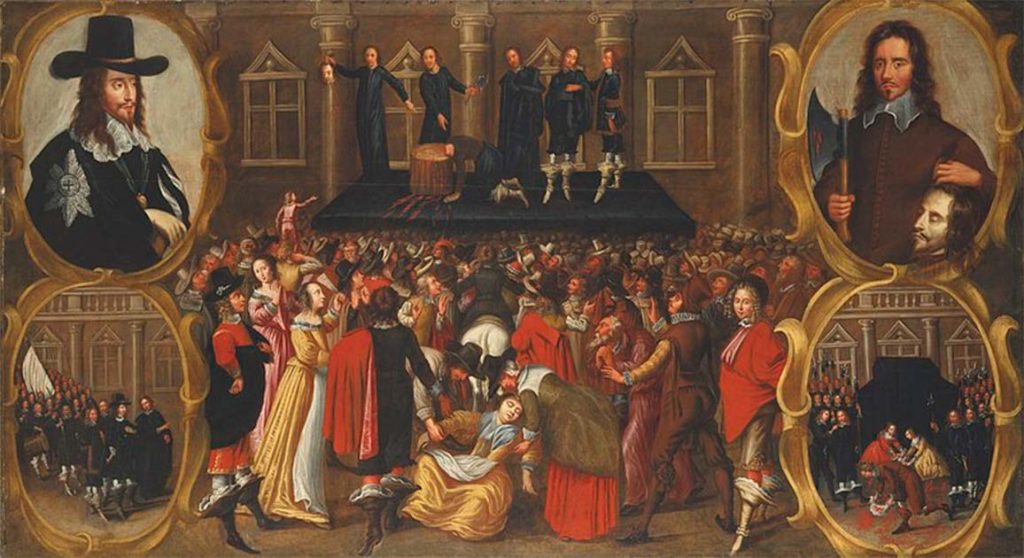Europe in the 17th century was in turmoil. These turbulent times were marked by political upheaval, civil strife, and a pivotal event that sent shockwaves through England and beyond: the trial and execution of King Charles I.
At the center of this momentous chapter in history was Isaac Dorislaus, a Dutch legal scholar and diplomat whose life became inextricably linked to the fate of the English monarchy. Dorislaus played an instrumental role in the trial of Charles I, something which ultimately cost the king his head.
Not that Dorislaus had long to celebrate. He himself was murdered himself shortly afterward. A coincidence or an act of revenge committed by angry Royalists?
Who Was Isaac Dorislaus?
Born in 1595 in Alkmaar, Holland, Dorislaus was raised in a strongly Calvinist (the Protestant theological system named for its Scottish founder, John Calvin) family. He was educated at Leiden and then moved to England to become Cambridge University’s first-ever history professor.
From the very outset, he was a controversial figure. He was staunchly anti-monarchy and attacked the legitimacy of kings whenever given the chance. He argued that the people of England should revolt, pointing at England’s Anglo-Saxon roots and claiming the people had been much freer and democratic before the Normans had come in and conquered everything.
Surprisingly, his arguments for Republicanism got him in very little hot water, despite the fact he was quite clearly making barely veiled attacks on King Charles I. In particular, Dorislaus took umbrage with Charles’s supposed Catholic sympathies and his failure to protect England’s interests against powerful foreign nations.
At first, this does not seem to have caused him too many problems. His only punishment seems to have been a delay in his doctorate being granted (historically calling for regicide has tended to warrant slightly more severe punishments, to say the least.
- The Glorious Revolution: Did the Dutch Steal the English Crown?
- John Peter Zenger: How the US Constitution Got its First Amendment
Even more surprisingly Dorislaus quite quickly found himself in a position of power. In 1629 he was admitted into the Faculty of Advocates, an independent body of lawyers that can plead in any case before any of Scotland’s courts.
In this position, he wielded considerable power and soon changed his stance on the dangers of unrestricted power, evidenced by his attempts at removing any legal protections for the accused in Scotland’s courts. It was his role as a lawyer that would come to tie his legacy to that of Charles I.

So, we know Dorislaus was no fan of Charles I but what connection does a Dutch historian and lawyer have with one of England’s most famous kings? Well, it comes down to the role Dorislaus played during the English Civil War and the subsequent trial of the King. As a Dutch legal scholar and diplomat, Dorislaus found himself deeply engaged in the political and legal turmoil of the 17th century.
The English Civil War was fought by the Parliamentarians on one side, led by the Puritan Oliver Cromwell, and the Royalists on the other side, led by King Charles I. It shouldn’t be hard to guess whose side the Calvinist Dorislaus took.
He of course quickly aligned himself with the Parliamentary side during the war. But he wasn’t just a passive observer, he was a pivotal figure in drafting the charges laid out against Charles I during his trial. These charges were a culmination of his legal expertise, and they accused the King of high treason, among other offenses.
The charges that Dorislaus helped formulate laid the foundation for the trial of the King, a trial that was to have far-reaching consequences. Charles I was ultimately found guilty and executed on January 30, 1649, by beheading.
While Dorislaus didn’t play a prominent role in the court proceedings themselves, his drafting of the charges won him few friends among Charles’s loyal Royalist followers. And this willingness to place himself at the heart of proceedings led to his death.
The Death of Dorislaus
In the end Dorislaus didn’t live much longer than Charles I. On 2 May 1649, just a few short months after Charles’s execution Dorislaus was assassinated in The Hague in the Netherlands during a diplomatic mission.
- Eight English Rulers Who Came to a Sticky End
- Killed by the Freemasons? The Secrets of William Morgan
Things were strained between Holland and England since Cromwell believed Holland had profiteered during the English Civil War. Things were so strained in fact that not long after Dorislaus’s death the First Anglo-Dutch War began.
While negotiating with representatives of the Dutch Republic Dorislaus at the Hague Dorislaus was murdered by a group of royalists led by Walter Whitford. His assassination was a violent act that shook the political landscape of the era. It is widely believed that his death was a direct result of his role in the trial of Charles I.
As a staunch supporter of the Parliamentary side and a contributor to the drafting of charges against the King, Dorislaus had made himself a target for those who opposed the trial and execution. The motive behind his assassination was clear: it was an act of revenge carried out by royalist sympathizers and supporters of the monarchy.

They saw Dorislaus as a symbol of the Parliamentarian cause, and his untimely death was intended to send a message of opposition to the actions taken against the King. The message was received loud and clear.
Cromwell and his associates were dismayed to hear of Dorislaus’s untimely passing while the remaining royalists met it with jubilation. The murder also didn’t help things between England and the Dutch. Cromwell accused the Dutch of allowing Whitford to get away when in fact it had been a Portuguese Ambassador who helped him escape to the Spanish Netherlands.
Dorislaus’s assassination was a grim reminder of how deeply divided the nation was during the English Civil War, where political convictions often had life-or-death consequences. To one side he was a hero, while to the other he was a villain. While half the country rejoiced at the news of his death, the other mourned it.
Dorislaus’s story illuminates how deeply convictions ran during this era and how one man’s role in history could ultimately cost him his life, leaving a legacy of political tumult and ideological strife in its wake. While his name has largely been forgotten, his impact on the English monarchy, and England at large, lasted long after his death.
Top Image: Although the murder of Isaac Dorislaus officially remains unsolved, it was almost certainly Royalist revenge of the death of King Charles I. Source: Ducarme; St. John St. Aubyn Bar / CC BY-SA 3.0.